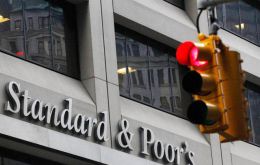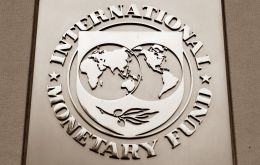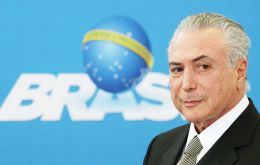MercoPress. South Atlantic News Agency
Tag: International Monetary Fund, IMF
-
Wednesday, May 9th 2018 - 07:16 UTC
UK appoints Trade Commissioner for Latin America and the Caribbean

The United Kingdom's International Trade Secretary, Dr Liam Fox, named a new Trade Commissioner to champion British trade with Latin America and the Caribbean, as the UK prepares for future trade agreements with countries around the world.
-
Tuesday, April 24th 2018 - 07:22 UTC
IMF forecasts Argentina will grow 2% this year because of the drought and fiscal shortcomings

The International Monetary Fund’s (IMF) World Economic Outlook update for April 2018 has reduced its expectations of growth for Argentina this year, and its projected annual inflation rate largely exceeds the 15% goal set by president Mauricio the Macri administration in December 2017.
-
Monday, November 13th 2017 - 08:30 UTC
IMF mission praises Macri's reforms but warns on inflation and budget deficit

An IMF visiting team in Buenos Aires concluded its annual review of Argentina's economy and praised the efforts of President Mauricio Macri's nearly two-year-old government to transform the economy saying it has yielded “significant” gains, but also warned that risks remain.
-
Wednesday, October 18th 2017 - 08:28 UTC
China's credit rating downgraded by S&P, “but might still be too good”

China's credit rating has been downgraded by Standard & Poor's (S&P) because of worries over the rapid buildup of debt in the country. S&P cut China's rating by one notch from AA- to A+, saying its debts had raised “economic and financial risks”.
-
Thursday, October 12th 2017 - 20:44 UTC
IMF forecasts Venezuela's inflation to reach 2.300% next year and unemployment 30%

Venezuela’s triple-digit annual inflation rate is set to jump to more than 2,300% in 2018, the highest estimate for any country tracked by the International Monetary Fund.
-
Tuesday, July 25th 2017 - 06:29 UTC
IMF lowers US economic growth forecast for 2017 and 2018

The IMF on Sunday lowered its economic growth forecasts for the United States to 2.1% for this year and the next, down from the 2.3% for 2017 and 2.5% for 2018 that it had predicted in April.
-
Thursday, January 19th 2017 - 08:00 UTC
Brazil confident in “recovery curve” coming from a very low level, says Meirelles

Brazil's Finance Minister Henrique Meirelles has admitted that the government is going to revise its official forecast for this year's GDP growth, but gave no details as to the extent of the change. In its latest forecast, the government had estimated the economy was going to grow 1% in 2017.
-
Friday, December 9th 2016 - 16:30 UTC
IMF ups forecast for Uruguay's growth in 2016 to 0.7% - In October it had anticipated 0.1%

The International Monetary Fund (IMF) on Thursday raised its forecast for economic growth in Uruguay this year to 0.7%, a substantial increase from the 0.1% estimated in October, and underlined the country's resilience to the problems of its neighbors Argentina and Brazil.
-
Wednesday, November 16th 2016 - 09:38 UTC
IMF anticipates a more gradual recovery of the Brazilian economy than forecasted

International Monetary Fund's executive board said on Tuesday that the Brazilian economy could be close to pulling out of a grueling recession, but faces a long and bumpy recovery that hinges on the approval of unpopular reforms. In its considerations of the IMF staff's annual report on Brazil, the executive board said that despite the new government's efforts to avoid a fiscal crisis they expected a gradual recovery in Latin America's top economy.
-
Thursday, November 10th 2016 - 12:08 UTC
IMF lifts motion of censure on Argentina for manipulating data

The International Monetary Fund (IMF) on Wednesday lifted the censure motion that weighed on the country since 2013, when it decided to sanction Argentina because it considered that statistics at the National Census' Institute (Indec) were being manipulated.
